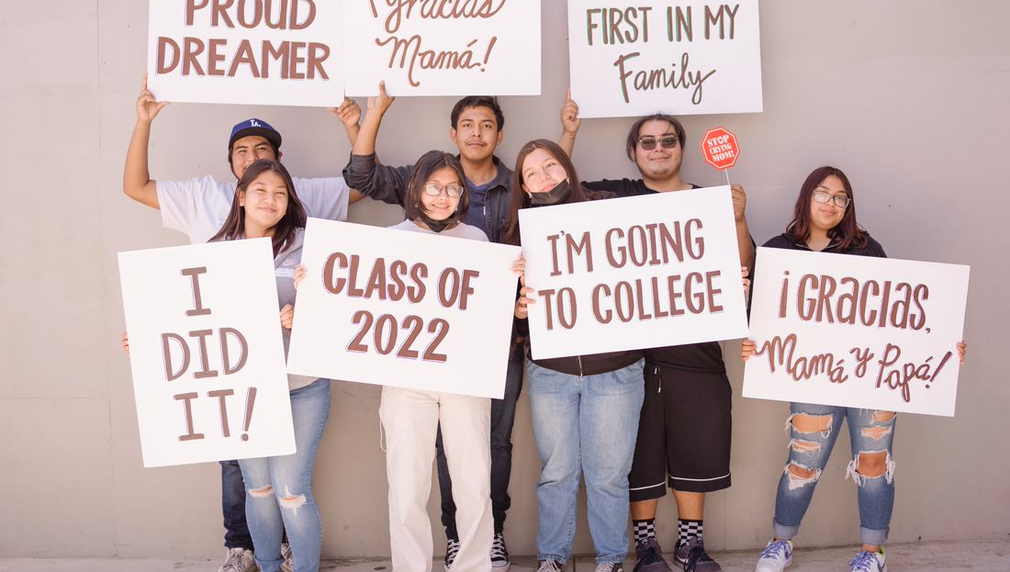Empowering low-income youth to launch meaningful careers
Fulfillment Fund uplifts young people from poverty by empowering them to get into college, graduate (92% graduation rate) and embark on meaningful career paths. Starting in 9th grade we expose students to a variety of fields and give them concrete steps to get there, including skills training, networking connections, and exclusive internship/first job opportunities. Last year we served over 3,200 students who were 98% BIPOC, 84% low-income, and 76% first-generation. We seek support to grow and deepen our career readiness programming.

What is the primary issue area that your application will impact?
Youth Economic Advancement (sponsored by Funding Partner, TBA)
In which areas of Los Angeles will you be directly working?
County of Los Angeles
In what stage of innovation is this project, program, or initiative?
Expand existing project, program, or initiative
What is your understanding of the issue that you are seeking to address?
More than 70% of jobs today require college degrees, yet enrollment among low-income students has declined dramatically since 2020. Those who do matriculate are also less likely to persist than before the pandemic, and college graduation remains significantly lower among underserved students. However, students need more than just postsecondary credentials to qualify for well-paying jobs; “soft skills” such as time management, problem-solving and conflict management are repeatedly cited as one of the most important factors in hiring. Often, low-income students do not have ready training in their families/communities to succeed in those first jobs. While a college education remains incredibly valuable, it is also more expensive. 1 in 8 Americans has college debt; households earning less than $35K a year average $30K in loans. Without proper guidance to pursue careers that lead to economic mobility, low-income students risk becoming un-or under-employed while contending with college debt.
Describe the project, program, or initiative this grant will support to address the issue.
Fulfillment Fund remains the largest nonprofit in L.A. providing college access opportunities for high schoolers AND sticking with them throughout college to ensure they graduate and embark on a successful career path. Our effect is remarkable: • Last year 93% of our high school seniors graduated vs. 81% for LAUSD overall. • Among our graduates, college enrollment approached 100% pre-pandemic and has remained high even during COVID: 82% enrolled in college last year. As context, the LAUSD college-going rate among all seniors in 2020 was 59%. • Last year 95% of our college students were persisting towards their degrees or graduated. In comparison, only ~25% of LAUSD high school graduates finish college within six years, while our most recent cohort attained a 92% six-year graduation rate. The national average is 63%, which includes students of all backgrounds and income levels. Our career readiness initiatives currently include a Career Speaker Series (featuring professionals from a variety of fields), Career Expo (structured networking), skills workshops (resume writing, interviewing, etc.), experiential practice, and connections to exclusive jobs/paid internships. With grant funding we look to grow our impact by enhancing and expanding this work, combining current activities under a newly created staff position to lead our Career Readiness program. This will include offering a deeper range of services, more individualized student supports, and engaging new partners.
Describe how Los Angeles County will be different if your work is successful.
We seek to create generational change and widen perspectives to break down barriers that divide. For our students, who hail from first-generation families in low-income communities, education is key to breaking the cycle of poverty and forging a path to meaningful economic mobility. We support our 98% BIPOC students to overcome financial roadblocks, cultural expectations and responsibilities, and geographic limitations to give them the opportunities, resources, and skills they need to complete high school, get into college, graduate, and launch into a promising career. Through our work, students not only earn a college degree and start a career that can uplift themselves, but can also add to uplifting L.A. As future employees at L.A. companies with “a seat at the table”, they have a chance to use their diverse lived experiences to break down racial barriers and create greater equity in their companies. Thus, we aim to empower youth for brighter individual and collective futures.
What evidence do you have that this project, program, or initiative is or will be successful, and how will you define and measure success?
Our primary impact measures are student outcomes such as high school graduation, college enrollment, persistence, and graduation, as compared with like groups. We also track real-time and longitudinal outputs and collect robust engagement data to measure our progress towards meeting goals and to inform decision making. Examples include total number of students served, college access lesson attendance, number of 1:1 counseling or advising sessions, % FAFSA completion, college success webinar participation, number of college tours sessions offered and attended, amounts of scholarships awarded, etc. We also measure our students’ gains in knowledge, beliefs, and attitudes about higher education via pre- and post-intervention surveys. With a new and enhanced focus on career readiness, we are exploring metrics around first meaningful jobs and long-term career outcomes and are working with a strategic planning consulting firm to engage alumni and other stakeholders to help shape these tools.
Approximately how many people will be impacted by this project, program, or initiative?
Direct Impact: 3,200
Indirect Impact: 200